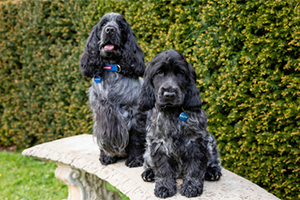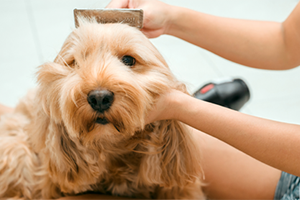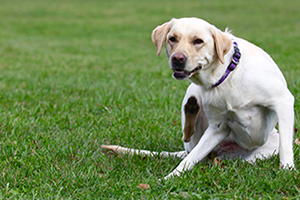
English Bulldog

An easy-going breed with a gentle nature
Vital stats
Swipe to view more
| Size: | Medium |
| Coat: | Short and smooth |
| Exercise | 30 minutes a day |
| Life span: | 7+ years |
| Flat-faced: | Yes, consider this breed's additional health needs before buying |
| Breed group: | Utility |
| Temperament: | Loyal, friendly, easy-going |
English Bulldog temperament & personality

English Bulldogs are sociable and wonderfully laid-back characters; the breed is prized for its personality rather than their intelligence.
- Known to be a wilful breed, English Bulldog owners often say their dog will pause before responding to commands, weighing up what’s in it for them!
- Stubbornness aside, English Bulldogs are sociable, friendly and gentle and make excellent companions and family pets.
- These laidback dogs are more than happy to relax on the sofa and adapt well to apartment living and smaller spaces; just make sure to give these couch potatoes enough exercise to avoid weight gain.
English Bulldog training & exercise

Training tips
- English Bulldogs are not a breed known for their intelligence and it’s likely that your dog will only pick up basic obedience commands, rather than lots of tricks.
- Training your English Bulldog will take patience – the breed is known for its stubborn streak and you may need to ask a few times before your Bulldog responds.
- English Bulldogs’ preferred training sessions are fun, but kept short, with plenty of positive reinforcement.
Exercise
- English Bulldogs are low-maintenance when it comes to exercise and only need around 30 minutes a day. Split walks into two 15-minute sessions to prevent overexertion.
- Unlike some dogs, English Bulldogs aren’t natural swimmers so keep them away from water.
Keeping them happy
- As a brachycephalic breed, English Bulldogs’ short muzzles make them less suited to hot weather. It’s best to limit their time spent outdoors during the warmer months. Make sure they have access to plenty of water as well as shady spots to escape the heat.
- Laidback and easily pleased, English Bulldogs prefer a calm and relaxed lifestyle and are quite happy to spend the day napping. Just make sure your dog gets enough exercise to prevent unhealthy weight gain.
Game ideas
- English Bulldogs are very strong and a game of tug-of-war (with a dog-safe rope toy) will be right up your pet’s street and doesn’t require too much running around.
Common English Bulldog health conditions

English Bulldog grooming

With a short, smooth coat, English Bulldogs don’t require as much brushing as long-haired breeds but they are considered heavy shedders.
- To help control shedding, it’s a good idea to brush your English Bulldog once a week to shift excess hair.
- English Bulldogs’ commonly have excessive skin folds around their nose which will require daily attention to ensure they are clean, dry and free from infections.
- Some English Bulldogs’ tails sit very close to their bodies in a special groove called a tail pocket, and will need regular wiping to stay clean.
- Use grooming time to check your dog for skin irritation, parasites, lumps and bumps and signs of ear infections, such as black or brown wax or a strange smell.
English Bulldog nutrition

Their signature laziness combined with a love of food means that obesity is a common English Bulldog health problem, so it’s important to find the right diet for your pet.
- Their naturally thickset physique and loose-fitting skin can mask signs of obesity. Check in with your vet to make sure your English Bulldog is a healthy weight.
- Whilst it’s important that your English Bulldog doesn’t overexert themselves, exercise is also important to keep your dog a healthy weight.
- English Bulldogs can be greedy eaters so portion control is key. Feed your pet a high-quality food and always follow the portion guidelines on the packaging.
- Whilst positive reinforcement is a great training method, go easy on the snacks and treats when using food as a motivator.
- Remember, English Bulldogs are slow to mature compared to other breeds, and may not reach adulthood until between 18 to 24 months. Bear this in mind when moving from puppy food to adult food and consult your vet if you’re not sure.
English Bulldog frequently asked questions
If you’re thinking about getting an English Bulldog, it’s important to consider that the breed is more likely to suffer from health conditions related to being flat faced. While, the gentle English Bulldog makes for an excellent and lovable family pet, their needs might not be right for every lifestyle.
This friendly breed will usually get on well with other animals, and their patience and slower way of life mean they’re great with children, even very young ones. As with all dogs, you should always supervise playtime between your English Bulldog and children to make sure everyone is safe and happy.
Discover some of the most popular dog breeds
English Bulldog insurance considerations
We always offer these things as standard:
Physiotherapy & pet therapies
Along with physiotherapy, which is covered within the Vet Bills benefit, we also cover Pet Therapies like herbal medicine, homeopathy and acupuncture. You can also claim for hydrotherapy, up to £500 per illness/injury in dogs and cats (no additional limit for rabbits).
Petplan is a trading name of Pet Plan Limited (Registered in England No. 1282939) and Allianz Insurance plc (Registered in England No. 84638), Registered office: 57 Ladymead, Guildford, Surrey GU1 1DB.
Pet Plan Limited is authorised and regulated by the Financial Conduct Authority. Financial Services Register No. 311969. Allianz Insurance plc is authorised by the Prudential Regulation Authority and regulated by the Financial Conduct Authority and the Prudential Regulation Authority. Financial Services Register No. 121849. Pet Plan Limited is a subsidiary of Allianz Insurance plc.













































